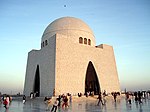Debal
| Part of a series on the |
| History of Karachi |
|---|
 |
| Prehistoric period |
| Ancient period |
| Classical period |
| Islamic period |
|
| Local dynasties |
| British period |
| Independent Pakistan |
Debal (Urdu, Arabic, Sindhi: ديبل) was an ancient port located near modern Karachi, Pakistan.[1] It is adjacent to the nearby Manora Island and was administered by Mansura, and later Thatta.
Etymology[]
In Arabic history books, most notably in the early eighth century accounts of the arrival of Islam in the Indian subcontinent, it was documented as Daybul (Dīwal ~ Dībal ديبل). One view is that the name was derived from Devalaya, meaning abode of God in Sanskrit. The name Debal is derived from Deval, meaning 'temple'.[2]
History[]
According to modern archaeologists, Debal was founded in the 1st century CE, and soon became the most important trading city in Sindh. The port city was home to thousands of Sindhi sailors including the Bawarij. Ibn Hawqal, a 10th-century writer, geographer and chronicler, mentions huts of the city and the dry arid land surrounding the city that supported little agriculture. He mentions how efficiently the inhabitants of the city maintained fishing vessels and trade. The Abbasids were the first to build large stone structures including a city wall and a citadel. An earthquake in 893 AD reportedly destroyed the port city of Debal.[3]
Debal and the Manora Island were visited by Ottoman Admiral Seydi Ali Reis (1498–1563) and mentioned in his book Mir'ât ül Memâlik in 1554. In 1568 Debal was attacked by the Portuguese Admiral Fernão Mendes Pinto (1509 – 1583) in an attempt to capture or destroy the Ottoman vessels anchored there. Fernão Mendes Pinto also claims that Sindhi sailors joined the Ottoman Admiral Kurtoğlu Hızır Reis on his voyage to Aceh. Debal was also visited by the British travel writers such as Thomas Postans and John Elliott. According to Eliot, who is noted for his vivid account on the city of Thatta, parts of the city of Karachi and the island of Manora at the port of Karachi constituted the city of Debal.
See also[]
- Kulanch
- Kulachi (tribe)
- Kolachi jo Goth
- Krokola
- Karachi
- Mai Kolachi
- Kolachi (port)
- Keti Bandar
References[]
- ^ Hamidi, Taswir Husain. (1997). Entry Route of Muhammad Bin Qasim in South Eastern Sindh. Journal of the Pakistan Historical Society 45(4): 337-345.
- ^ "Medieval India: Enslavement of Hindus by Arab & Turkish Invaders". Sanskriti - Hinduism and Indian Culture Website. 2014-12-10. Retrieved 2020-02-13.
- ^ "The Significance of the 1819 Allah Bund Earthquake, 200 Years on". thewire.in/. Retrieved 2019-06-15.
Further reading[]
- Malcolm Robert Haig (1894). The Indus Delta Country: A Memoir, Chiefly on Its Ancient Geography and History. K. Paul, Trench, Trübner & Co. p. 42.
Debal.
- Former populated places in Pakistan
- History of Sindh
- History of Karachi
- Ancient ports and harbours